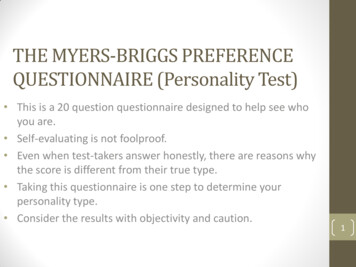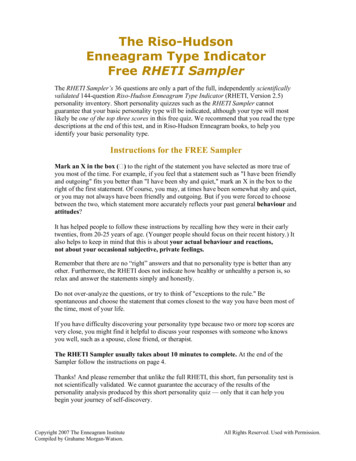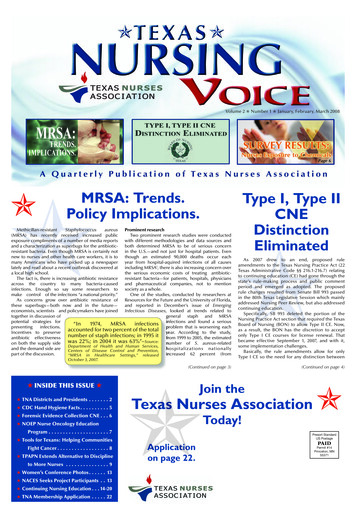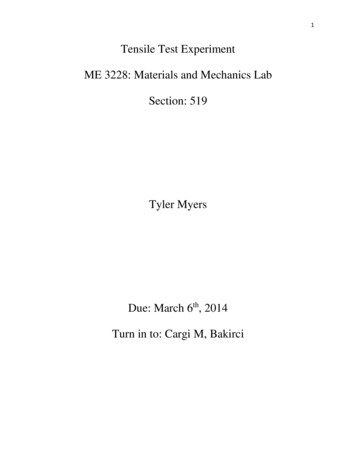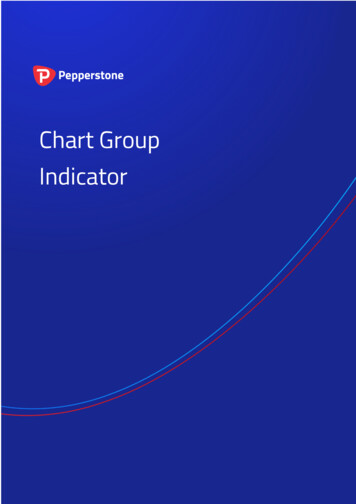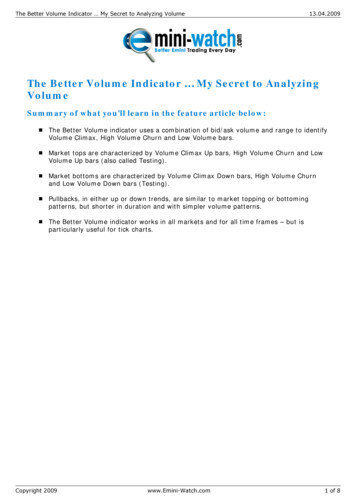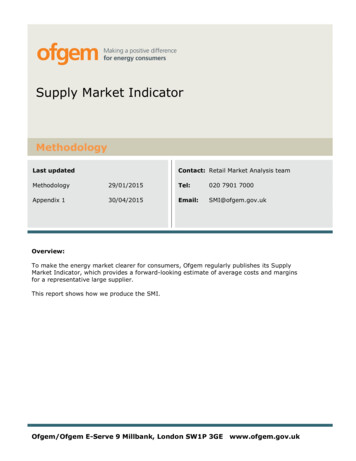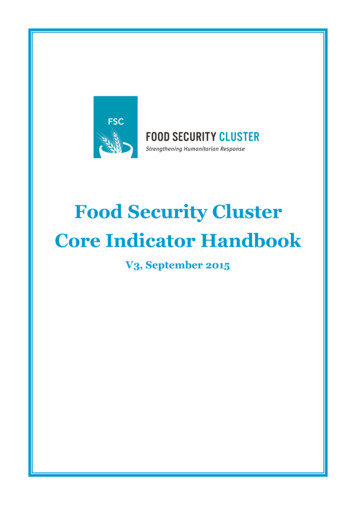
Transcription
Myers-Briggs Type Indicator (MBTI )ISFP(Introversion, Sensing, Feeling, PENFPENTPESTJESFJENFJENTJThe above four letters are known as a ‘type’ and are based on the Myers-Briggs Type Indicator (MBTI ). If you have not already completed an assessment to find out your type, click here totake the MBTI . After completing the assessment, sign up for a workshop to learn more aboutthe MBTI and receive your results.Note: The MBTI is available to U of S students and alumni and an NSID is required to sign in and complete the assessment.The following information has been compiled from numerous MBTI resources. It is intended to bean overview and shows how type can apply to many aspects of life. It is not, however, a completedescription. Please see the attached works cited list for additional information.ISFP OverviewISFPs are generally flexible, practical, action-orientated, and empathetic. They are also commonly seen as lighthearted,easygoing, and joyful. The ISFP tends to be quiet and usually only shares their deeper feelings and thoughts with peoplethey are comfortable around. The ISFP has strong personal values and will live their lives to reflect these values. As such,they focus their energy inward in order to maintain their inner harmony and further ponder their values. ISFPs oftenhave a carefree approach to life and desire freedom, spontaneity, and living in the moment. As such, the ISFP does notmake too many long-term plans and may miss the future implications of their actions and choices. The ISFP also tendsto be drawn towards nature and sees the beauty in humanity and in their environment.ISFPs often enjoy serving and helping others. They are generally good at dealing with problems because they maintaina focus on the people involved. They are also very aware of the behavior of others and may be critical of what theyobserve. The ISFP has a desire to please people and may struggle with being assertive. They also have a natural tendencyto trust people and should be cautious that others do not take advantage of them. The ISFP is often a good friend thatdoes not force their own values on others. They tend to take their time to develop close relationships with a small groupof friends and generally communicate their feelings for people through actions instead of words. The ISFP also strivesfor harmony in their relationships and may experience difficulty dealing with conflict.The ISFP generally gathers detailed information through their five senses. They naturally observe and seek tounderstand information that pertains to people. They will then use their values and feelings to evaluate the gathereddata and make decisions. The ISFP tends to be grounded in what is real or practical and has limited interest in theintuitive thoughts of others unless they can find ways to apply these ideas. They readily accept immediate challenges andrespond quickly to accomplish a task, address an issue, or solve a problem. The ISFP often strives to follow through onimportant commitments to people. However, their susceptibility to take on too many tasks may reduce their ability tocomplete all their obligations.
Myers-Briggs Type Indicator(MBTI NTJINTPENTPENTJISFP and SchoolLearningThe ISFP student will often Learn most effectively through practical application and hands-on experience Struggle with traditional teaching that focuses on theory or abstract thinking Be interested in topics that pertain to people Prefer adaptable professors that present material in a clear manner Doubt implications of good test scores and underestimate their capabilities Prefer a quiet study environmentWritingThe ISFP generally excels at descriptive writing that is based on what they experience. They are often inspired to writeon topics that reflect their interest in nature or people. However, they may find writing on personal experiences to bedifficult due to their desire for privacy. The ISFP may also struggle with logically analyzing topics. In their writing, theISFP tends to consider their audience but should be cautious that they are not writing only to please the reader.In the writing process, the ISFP will often Begin by gathering and reflecting on information Need to limit the amount of information they gather Organize their writing based on a step-by-step process and established model Require a quiet environment that is free of distractions Practically apply the information that they gather Desire positive feedback and encouragement from their audience May need to return to the original draft to strengthen the conclusion and omit unnecessary details or storiesProcrastinationThe ISFP’s preference for keeping things open-ended tends to influence their procrastination in completing tasks.They may also avoid or put off work that is deemed irrelevant or uninteresting. At times it can also be difficult for theISFP to delay their desire for immediate enjoyment in order to obtain long-term academic achievement. The ISFP mayincrease their motivation by connecting their efforts to helping people, maintaining harmony, or pleasing others. It isalso important for the ISFP to outline a project plan that includes rewards. As well, the ISFP would likely decrease theirprocrastination by further developing their time management skills.2Student Employment & Career CentreStudent Employment & Career Centre University of Saskatchewan 97 Campus Drive Saskatoon SK S7N 4L3Tel: 306-966-5003 Fax: 306-966-5092 E-mail: student.employ@usask.ca Website: www.usask.ca/secc
Myers-Briggs Type IndicatorISTJISTPESTPESTJ(MBTI SFP and Career ExplorationAn ISFP tends to find career satisfaction with careers that have the following characteristics: Reflects their inner values and fulfills a greater purpose, meets a need, or helps others Ensures task variety and projects of interest Fosters a supportive, positive, and cooperative work environment Encourages personal development Involves a combination of independent and one-on-one work Has limited work place politics or hidden motives Provides freedom to choose their tasks and select their own work speed Involves minimal procedures or strict requirements Requires limited public presentations or leading large groups of unknown peopleWhen exploring career options, an ISFJ will often Gather a lot of information on different career options Evaluate current positions but may miss future career possibilities Need to consider their long-term career goals Be inclined to gain experience and further understanding of a career through volunteering Delay their decisions while they explore their optionsCareers to ConsiderThe following is a list of suggested occupations that fit the qualities of an ISFP or are careers that other ISFPs have foundto be satisfying. Use this list as a starting point for further investigation but do not limit your options to only this list. Radiology Technologist Crisis Hotline Operator Clerical Supervisor Fashion Designer Medical Assistant Teacher: Elementary/ Waiter/Waitress BeauticianScience Nurse Computer Operator Tapestry Worker Physical Therapist Carpenter Bookkeeper Interior Designer Massage Therapist Mechanic Legal Secretary Landscape Designer Dental Hygienist/Assistant Surveyor Typist Jeweler Veterinary Assistant Police Officer Storekeepers & Clerks Potter Animal Groomer/Trainer Forester Operatives: All types Painter Geologist Gardener Dancer Cleaning Services Botanist Chef/CookFor information on a specific career, check out www.saskjobfutures.ca or www.alis.gov.ab.caStudent Employment & Career Centre University of Saskatchewan 97 Campus Drive Saskatoon SK S7N 4L3Tel: 306-966-5003 Fax: 306-966-5092 E-mail: student.employ@usask.ca Website: www.usask.ca/seccStudent Employment & Career Centre3
Myers-Briggs Type Indicator(MBTI NTJINTPENTPENTJJob SearchDuring their job search, an ISFP will often. Ask questions to gather job related facts and information Benefit from creating a specific job search outline Determine whether additional skill training is required for their desired job Network with people they know Seek out support for the job search process Naturally assess options based on what they value Need to objectively evaluate options and the long-term impact of their decisionsDuring an interview, an ISFP will often. Convey their ability to work well with others and adapt well to change Provide a description of their past experience but should be cautious not to provide too many details Benefit from practicing to discuss their skills and answer hypothetical questionsISFP and WorkAt work, the ISFP will often Require freedom and autonomy to complete tasks Gather specific details and facts Desire challenging work with tangible results Commit their energy and attention to tasks of interest Support the goals of the organization Identify the organizations current needs and respond accordingly Desire a harmonious work environment with limited conflict Respond well in situations that require quick changes Encourage and assist their coworkers Personalize their work space to create an aesthetically pleasing environment Require a quiet, private, and independent work environment Seek out ways to have fun and enjoy their work4Student Employment & Career CentreStudent Employment & Career Centre University of Saskatchewan 97 Campus Drive Saskatoon SK S7N 4L3Tel: 306-966-5003 Fax: 306-966-5092 E-mail: student.employ@usask.ca Website: www.usask.ca/secc
Myers-Briggs Type IndicatorISTJISTPESTPESTJ(MBTI t work, the ISFP should be aware that they may Require additional organization and time management skill development Have difficulty handling large or difficult projects Neglect policies, procedures, or protocols and complete tasks as they deem appropriate Be oblivious to the hidden motives of people Empathize with the conflict and issues experienced by their coworkers Need to maintain their motivation for uninteresting tasks Benefit from setting their own deadlines throughout a project Need to assert their ideas even if they cause conflict or disharmony Remove themselves from a situation, become critical, oppose structure, or question their worth when they feelunappreciatedTeamworkOn a team, the ISFP will often Appreciate team members that are caring, considerate, and helpful Provide practical assistance to team members Generate ideas for others to consider or further develop Motivate others to work towards an established goal Be attuned to the underlying morale of the team Use an unassuming approach that fosters cooperationOn a team, the ISFP should be aware that they may Resist directions that are controlling or interfere with their freedom Irritate team members when they are seen as too modest, kind, or sensitive Become frustrated with inconsiderate, unfocused, or illogical team members Need to learn how to accept recognitionLeadershipThe ISFP often prefers a supportive or coordinating role instead of organizing people or situations. However, ina leadership position, the ISFP will often Focus on creating a team environment Motivate individuals through creating a sense of loyalty Influence team by exemplifying desired behaviors and drawing on peoples’ good intentions Support and appreciate individual members Make decisions that reflect the majority of group members Quickly adapt to needs as they ariseStudent Employment & Career Centre University of Saskatchewan 97 Campus Drive Saskatoon SK S7N 4L3Tel: 306-966-5003 Fax: 306-966-5092 E-mail: student.employ@usask.ca Website: www.usask.ca/seccStudent Employment & Career Centre5
Myers-Briggs Type Indicator(MBTI NTJINTPENTPENTJISFP and LifeCommunicationThe ISFP will often Want to hear clear expectations, practical information, specific details, and positive encouragement Spend the majority of a conversation listening to the other person Prefer opportunities for one-on-one discussions Limit the amount of personal information they share Voice their opinion only when their personal values are violated Personalize negative feedback Avoid conflict or confrontational situationsThe ISFP should be aware that they may need to Directly communicate their needs and wants Assert their opinions when they are treated unfairly Intentionally provide critical or constructive feedback Address conflict to ensure long-term harmony Become comfortable with sharing their accomplishmentsDecision MakingWhen it comes to decision making, the ISFP will often Subjectively view each option by integrating their personal values and considering the impact on people Benefit from logically considering additional objective criteria Need to intentionally evaluate the long-term impact or big picture implications Need to be cautious that their decisions are not too heavily influenced by others Dislike uncertainty and need to be cautious not to make hasty decisionsPlayingThe ISFP tends to enjoy participating in hobbies during their free time and will often personally invest in their work tomake it more than just a job. They maintain a balanced approach to life that ensures both their work and their friendsand family receive an appropriate amount of attention. However, the ISFP may need to be assertive and ensure that theirpersonal needs are not neglected. As a student, the ISFP is inclined to join service orientated campus groups and tendsto be an enjoyable roommate. In their personal lives, the ISFP postsecondary student is often timid about initiatingromantic dates or relationships.6Student Employment & Career CentreStudent Employment & Career Centr
Myers-Briggs Type indicaTor (MBTI ) ISFP (Introversion, Sensing, Feeling, Perceiving) The above four letters are known as a ‘type’ and are based on the Myers-Briggs Type Indicator

